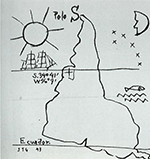Gli italiani non hanno pianificato la sicurezza dell’uscita dell’ostaggio.
Così titola stamane il Washington Times, il quotidiano più vicino al governo statunitense, praticamente la PRAVDA dei neocons.
Come previsto, è colpa di Nicola Calipari. Come i macchinisti degli Eurostar che quando muoiono è sempre colpa loro, anche Calipari è un colpevole perfetto. Inoltre partoriscono l’assoluta cazzata degli 8 colpi e non 400 (una sola sventagliata di una sola arma automatica corrisponde a varie decine e lì ha sparato più d’uno per molti secondi). E il cellulare resta sequestrato.
http://www.washtimes.com/national/20050308-121240-1847r.htm
Italy didn’t plan safe escape for hostage
By Rowan Scarborough
THE WASHINGTON TIMES
Italian security forces failed to make arrangements for safe passage out of Iraq for a freed Italian reporter, whose car was fired on by U.S. troops, killing intelligence agent Nicola Calipari who brokered the reporter’s release, according to an internal Pentagon memo.
The memo says checkpoint soldiers are trained to deal with erratic speeding vehicles whose drivers ignored warnings — a profile that matches the Army’s version of events in Friday night’s shooting.
The memo says more than 500 American troops have been killed on the streets and at checkpoints in Iraq. Mistaken shootings of civilians resulted in “few deadly incidents” since the U.S. started checkpoints in March 2003, according to the memo.
Meanwhile, the White House dismissed as “absurd” the stated suspicion of the reporter, Giuliana Sgrena, who said the United States tried to kill her because it opposes negotiations with terrorists to free hostages. Miss Sgrena, a reporter for the Italian communist newspaper Il Manifesto, provided no evidence.
“It’s absurd to make any such suggestion that our men and women in uniform would deliberately target innocent civilians,” said White House spokesman Scott McClellan adding: “We regret this incident. We are going to fully investigate what exactly occurred.”
Maj. Gen. William G. Webster Jr., who heads the Army’s 3rd Infantry Division, yesterday completed the “commander’s preliminary inquiry.” He has decided to conduct a more extensive inquiry, called a 15-6 for the regulation that authorizes it. Gen. Webster will name one officer to head the probe.
A U.S. official said that of all the cars that passed through the checkpoint that night, the reporter’s vehicle was the only one fired upon.
“Something that car did caused the soldiers to fire,” said the official, who asked not to be named.
The shooting occurred at night at a checkpoint on a notoriously dangerous road that links Baghdad to the international airport.
The incident has put a spotlight on “friendly fire” episodes that occur with some regularity in Iraq when motorists fail to heed warnings to stop at roadside checkpoints and are fired on by American troops who fear that the vehicle might be a weapon. Cars and trucks are a common weapon in suicide bombings and drive-by shootings.
The soldiers did not know that Miss Sgrena and Italian agents were headed in their direction on the way to the airport for a flight back to Italy.
An internal Pentagon information memo states, “This is war. About 500 American service members have been killed by hostile fire while operating on Iraqi streets and highways. The journalist was driving in pitch-dark and at a high speed and failed, according to the first reports, to respond to numerous warnings. Besides, there is no indication that the Italian security forces made prior arrangements to facilitate the transition to the airport.”
The left-leaning Italian newspaper La Repubblica reported yesterday that Mr. Calipari decided not to use available escort protection from the elite commandos who protect Italy’s Baghdad embassy.
Instead, he rented an inconspicuous pickup trick to recover Miss Sgrena, wrote La Repubblica’s top investigative reporter, Giuseppe D’Avanzo.
“In Iraq, the United States makes the rules and the Italian ally also must respect them. If it wants to break them, it must do so with a double game and some crafty tricks,” Mr. D’Avanzo wrote.
Italian magistrates have opened an inquiry into the killing and are arranging for the truck to be flown to Italy for examination by ballistic experts, judicial sources said. The magistrates also have obtained from the U.S. military the cellular phone that Mr. Calipari was carrying when he was shot.
Analysis of calls logged on the cellular phone might allow investigators to determine the speed at which the vehicle was traveling when U.S. troops opened fire on it, the sources say.
Mel Sembler, U.S. ambassador to Italy, reiterated Washington’s position in a 45-minute meeting with Prime Minister Silvio Berlusconi last night, diplomatic sources said.
Robert Maginnis, a retired Army officer and military analyst, said Rome should have done a better job coordinating Miss Sgrena’s exit once the Italians negotiated her release.
“It seems to me that the Italian secret service considers this a James Bond movie in Baghdad,” Mr. Maginnis said. “They’re driving around at night picking up a journalist who has been kidnapped and pretending they can get through a phalanx of checkpoints along the deadliest road in all of Iraq without being detected, much less shot up.”
The Army’s 3rd Infantry Division, which last week resumed command of Baghdad operations after participating in the 2003 invasion, said the soldiers had warned the approaching car repeatedly before opening fire.
According to the division, the patrol attempted to warn the driver to stop by hand and arm signals, flashing white lights, and firing warning shots in front of the car.”
?John Phillips contributed to this report in Rome.
 Gennaro Carotenuto
Gennaro Carotenuto